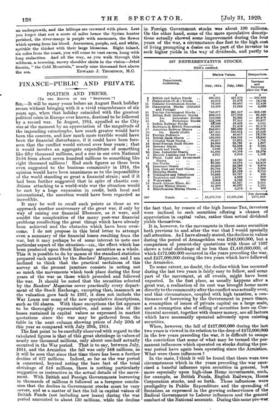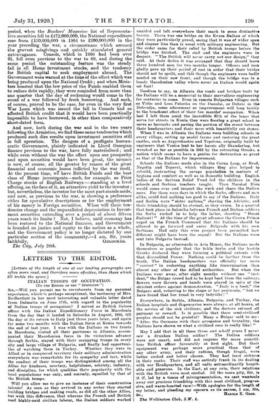FINANCE-PUBLIC AND PRIVATE But, - It will be many years before an
August Bank holiday recurs without bringing with it a vivid remembrance of six years ago, when that holiday coincided with the greatest political crisis in Europe ever known, destined to be followed by a record war. In August, 1914, appalled as the City was at the moment by an appreciation of the magnitude of the impending catastrophe, how much greater would have been the concern, and how much more terrible would have been the financial disturbance, if it could have been fore- seen that the conflict would extend over four years ; that it would involve an aggregate expenditure of something like fifty thousand millions, and a rise in our own National Debt from about seven hundred millions to something like eight thousand millions ! Had such figures as these been even suggested to the business community in 1914, the opinion would have been unanimous as to the impossibility of the world standing so great a financial strain; and if it had been further suggested that in spite of chaotic con- ditions attaching to a• world-wide war the situation would be met by a huge expansion in credit, both local and international, the assertion would have been regarded as incredible.
It may be well to recall such points as these as we approach another anniversary of the great war, if only by way of raising our financial Ebenezer, as it were, and amidst the complexities of the many post-war financial problems recollecting the great things which have already been achieved and the obstacles which have been over- come. I do not propose in this brief letter to attempt even a summary of the financial losses resulting from the war, but it may perhaps be of some interest to note one particular aspect of the situation-viz, the effect whioh. has been produced. upon Stock Exchange securities as a whole. This it is possible to do. by means of the standard statistics prepared each month by the Bankers' Magazine, and I am inclined to think that the practical usefulness of this survey at the present juncture consists in noting not so much, the movements which took place during the four years of the war as those which preceded_ and followed the war. It should be noted that the securities selected by the Bankers' Magazine cover practically every depart- ment. of the Stock. Exchange, excepting that inasmuch as the valuation goes back to. 1907, it does not include the War Loans nor • some of the new speculative descriptions, such as Oil shares. With those exceptions the list appears to be thoroughly represent&tiVe, and some idea of the losses sustained in capital values as expressed .in market quotations since the war may be gathered' from the table in the next column showing prices of July 20th of this year as: compared: with Julys 20th, 1914.
The first point to be carefully observed-with regard to the tabulated figures is that of this great shrinkage in values of nearly one thousand millions, only about one-half actually occurred in the War period. That is to say, between. July, 1914, and the Armistice the fall was only 548 millions, so it will be seen that since that time there has been a further decline of 427 millions. Indeed, so far as the war period is concerned; beyond noting• the bare fact of the- total shrinkage of 548 millions, there• is nothing particularly suggestive or instructive in the actual details of the move- ment. With British and Foreign Governments borrowing in thousands of millions it followed as a foregone concht. non that the decline in Government stocks' must be very severe, and as a matter of fact the fall in capital values of British Funds (not including new loans) during- the war period amounted to about 130 millions.. while the decline in. Foreign. Goverment stocks was about 190 millions,, On- the other hand, some, of the more speculative descrip- tions actually showed some improvement during the four years of the war, a circumstance due first to the high cost of living prompting ,a desire on the part of the investor to seek higher yields in the way of dividends, and partly to
387 REPRESENTATIVE STOCKS.
000's omitted.
Department, containing. Mkrket Values. Comparison.
July, 1914. July. 1920. Increase and Decrease ince the War.
£ £ £ 9 British and Indian Funds .. 690,355 457.372 - 282.989-
7 Corporation (U.K.) Stocks ..
46,812
31,678 - 14.134 11 Colonial Government Stocks ..
79;288
66,862
- 12,426
10 Corporation Stocks (Colonial 19479 11.863 - 4.626: and Foreign) 31 Foreign Government Stocks.. 746.677 891,517 - 355,180
26 British Rail. Ordinary Stocks
269.513 137.053 - 92.460 11 Do. Debenture Stocks 110;066 70.691
- 45,475
13 Do. Preference Stocks
124,168
77,811 - 50,857 5 Indian Railway Stocks .. 21.366 19.425 - 5.941 9 Railways in British Possessions 83,686 51.416 - 82.270 17 American Railway Shares .. 846,085 280.480 - 65,805 16. Do. Bonds (Gold) .. 24 Foreign Railways 167.425 58,645 158.916 40.417 - 10.510 - 18,228 14 British Bank Shares 182,650 20,657 164.810 18.901 - 18840 - 1,756 9 Colonial Bank Shares. . 18 Semi-Foreign Bank Shares 84.958 36.766 + 1.807 18 Brewery Stocks 40.040 23,836
+ s,zas 4 Canals and Docks ..
5,040
5,154 + 114
88 Cons.. Industrial Shares. ..
6 Electric Lighting and Power .. 81,662 4,021 66,288 2.916 - 16.874 - 1.103 11 Finan. Land and Investment
Shares 6 Gas Stocks 21 Insurance Shares .. 21,531 83,290 40.606
19;795
19.874 00.280 - 1.742 - 18.416 + 0,4374
8 Iron. Coal and Steel Shares .. 7 Shipping Shares
20.796 14,546 18,760 88.259 - 2.036 + 8;713 4 Telegraphs and Telephones .. 10,642 10,707 + 165
7 Tramways and Omnibus ..
5,516 4.658 - 858 4 Waterworks 2.854 2160
- 64
15 South African Mines. Sc. 55.458 52..887
- 2,6201
6 Copper Mining Shares 8 Miscellaneous Mining. Shares .. 41.208 1.763 40,087 2,272 1,121 + 509
C
Net decrease.
387 Totals £3.370.700 £2,395,246
£975,463.
the fact that, by reason of the high Income Tax, investors were inclined to seek securities offering a chance of appreciation in capital value, rather than actual dividend yields themselves. It is, however, to the movements -in these same securities both previous to and. after the war that I would specially, calf attention. As-I have already stated, the decline in values during the period of Armageddon was. £549,000,000, but a comparison of present-dig quotations with those of-1907 shows a total shrinkage of no less than £1,448,000,000, of which £472,000,000 occurred in the years preceding the war, aru11427,000,000 during,the two years which have followed the Armistice.
To some extent, no doubt, the decline which has occurred during, the last two years is. fairly easy to follow, and' some part of the movement, at all events, might have been expected: In the first place, as usually happens after great war, a realisation of its cost was brought home- more directly to the community after the tonffict was actually over; and that circumstance, coupled with high taxation, a con- tinuance of borrowing by the Government in peace times; a. resumption of issues of private capital on- a large scale; and a, resumption also of selling of securities here on Con- tinental account, together with dearer money, are•all factors which have necessarily- operated' adversely upon existing securities.
When, however; the fal oft42T,000,000 during the last two years is viewed in its relation to the drop of £472,000,000 in- the few years preceding the war, it is. difficult to escape the conviction that some of what may be termed: the pert manent influences which operated on stocks during the pm-, war period have again been operating since the Armistice. What were those influences ?
In the main, I think it will be found. that there were two circumstances which in the years preceding the-war exer. cised a baneful influence upon securities in general, but more especially upon high-class. Home investments, such; for example, as British Funds, English Railways, Home Corporation stocks, and so forth. Those influences- were prodigality in Public- Expenditure and the spreading of Socialism as expressed in the growing subservience of the Radical Government to. Labour influences and the general conduct of the National accounts. During this same pre-war. period, when the Bankers' Magazine list of Representa- tive securities fell to E472,000,000, the National expenditure rose from £150,000,000 in 1901 to £200,000,000 in the year preceding the war, a circumstance which aroused the gravest misgivings and quickly stimulated general extravagance. Consols, which in 1906 had been over 91, fell even previous to the war to 69, and during the same period the outstanding feature was the steady fall in all Home investment stocks, and the tendency for British capital to seek employment abroad. The Government were warned at the time of the effect which was being produced upon the National Credit ; and when Minis- ters boasted that the low price of the Funds enabled them to reduce debt rapidly, they were reminded from more than one quarter that the day of reckoning would come in the event of a war followed by fresh borrowing. And such, of course, proved to be the case, for even in the very first War Loan which was issued the fall in Consols had so affected British credit that it would have been practically impossible to have borrowed, in other than comparatively short-dated form.
And new, both during the war and in the two years following the Armistice, we find these same tendencies which produced such dire results upon investment securities still in full operation. The dangers of a profligate bureau- cratic Government, plainly -indicated in Lloyd Georgian finance previous to the war, have fully materialised ; and while even without the war the effect upon our prosperity and upon securities would have been great, the menace is now, of course, all the greater by reason of the great financial and economic losses inflicted by the war itself. At the present time, we have British Funds and the best class of Home inve,stn2ents—such, for example, as Prior Charge stocks of English Railways — standing at a level offering, on the face of it, an attractive yield to the investor ; but, nevertheless, the investor for the most part stands aside, and now, as previous to the war, is showing a preference either for speculative descriptions or for the employment of his money in Foreign securities. When -will these ten- dencies change and the unparalleled depreciation in Invest- ment securities extending over a period of about fifteen years reach its limits ? Not, I believe, until economy has been restored to the National finances, .and Government is founded on justice and equity to the nation as a whole, and the Government policy is no longer dictated by one particular section of the community.—I am, Sir, yours



































 Previous page
Previous page